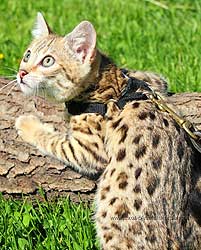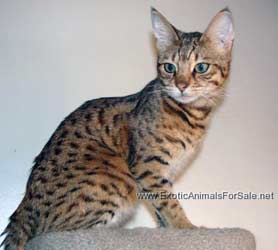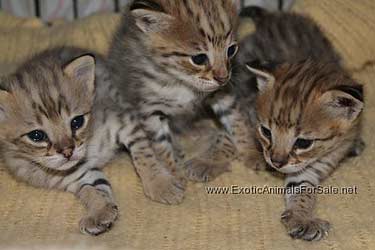Savannahs For Sale
F1, F2, F3, F4, F5 cats



savannahs
A savannah is the beautiful blend of African serval and the domestic cat. These types of cats are often called 'dog-like’ because of their friendly nature and how easy it is to train them. These cats can be easily trained to use a leash, play fetch and respond to other simple commands. This cat is very suitable for domestic life.

Savannah Kittens
- Price: $2,800.00
- Name: Trish
- Posted: 05/09/2024
- Email: Email Seller
- Location: Nevada
- Website: www.allearzsavannahcats.com
We are Nevada's oldest running Savannah cattery as well as the only licensed and permitted Savannah cattery in Las Vegas, Nevada. We were published in Cat Fancy magazine as well as the F1 Hybrid Diaries. From kittens in the show hall to the living ro...

Lily F2 Savannah Kitten
- Price: $2,500.00
- Name: Boss Savannahs
- Posted: 04/28/2024
- Phone: 4192763531
- Email: Email Seller
- Location: Florida
Meet Lily she’s 14 weeks old, F2 Female Savannah Cat, lots of energy & loves to play. She has her updated vaccinations, she’s perfectly healthy, TICA registered and ready for her furrever home. She’s very very big her age and growing everyday.
Physical Characteristics
This cat has a stripped and spotted coat with colors such as amber and silver. The breed has round eyes, erect ears, long legs, and long sleek neck. Next to its eyes, there are some black designs that appear like tear drops to give it unique appearance. While standing , the Savannah’s hind legs will stand taller than its shoulders.
When fully grown, this cat can measure up to 30 inches from nose to the tip of tail. The cat can weigh between 18 and 30 pounds. All foundation Savannahs have the letter 'F’ and a number associated with it to indicate how many generations it is from its Serval ancestor. For example:
First generation (F1) is 50 % serval
Second generation (F2) is 25 % serval
Third generation (F3) is 12.5 % serval
There are a lot of variables when it comes to size in Savannah. The size depends on the type of parents and the percentage of wild blood they have from their Serval ancestry. With each generation, the size will also decrease but most males will be larger than most domestic cats. The female can be smaller; may be the same size as the domestic cat but with a much larger personality. If you really want a large pet, choose F1 or F2 male.
Behavior Patterns
This is a very friendly cat. When brought up around humans and other domestic animals, its social . However, it can shy away from people and other pets, until domesticated. A domesticated savannah cat uses the head-butting action to greet its owners .Its also flicks and wags its tail when excited.
The Savannah pet is characterized by different behavioral patterns. The pet is a high jumper and when in standing position, the cat can jump to the height of 8 feet. It’s also one curious and very intelligent pet and will often learn how to open cabinets and cupboards. Unlike many domestic cats, the savannah is fond of water and in some cases, it will even immerse itself in cold water and swim.
This breed emits different sounds. It can emit a chirp just like its Serval father, purr just like it domestic parent or both. If angry or sacred, this pet will hiss, producing something that sounds more like the snake’s hiss. This can be quite scary if you are not aware of such a trait.
Housing for a Savannah
Quarantine your Savannah when you bring her home. Quarantine will accumulate her to the sounds of her new home, making her adjustments easier. The confinement room must contain a scratching post, litter box, food, water and toys to keep her busy. This room should also be free of dangers such as electrical wires.
You can prevent your pet Savannah from being a destructive cat by providing mental stimulation to help keep him occupied. You can apply bitter apple to cables of all electrical items in and around your house to discourage your pet from chewing.
Diet and Health Care
Savannahs do very well on a high quality dry cat food supplemented with canned wet food and some raw (or cooked) meat. Feed your pet with raw chicken 3 times until he reaches 6 months of age. After this, you can feed him twice a day. Avoid feeding the Savannah with cooked chicken-bones, as they can splinter and then pierce walls of his digestive tract.
For kittens, fill the bowl with bottled water instead of tap water. The temperamental digestive system of Savannah kittens cannot tolerate impurities that may exist in tap water. Offer clean purified water until the kitten turns 4 months.
Mix 1 meal each day with a multivitamin supplement and a scoop of probios' to help in healthy digestion. Add taurine-powder to a meal 3 times each week to help maintain great heart function and good vision. Also add calcium-powder to the meals twice per week for the strong bones. For kittens, measure 1/8 of a teaspoon and ¼ teaspoon for adults (both calcium and taurine).
The vaccinations and veterinarian health care of the Savannah is the same as that of domestic cats. Advice your vet that the pet should only get the killed-virus vaccines, as the live vaccines can lead to death. Apart from this, do not give your pet ketamin or a the preoperative cocktail; this can be deadly.







Comments